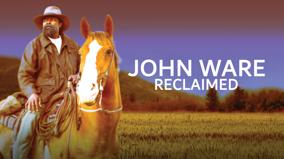Ninth Floor
Director Mina Shum makes her foray into feature documentary by reopening the file on a watershed moment in Canadian race relations – the infamous Sir George Williams Riot. Over four decades after a group of Caribbean students accused their professor of racism, triggering an explosive student uprising, Shum locates the protagonists and listens as they set the record straight, trying to make peace with the past.

Extras
Details
Director Mina Shum makes her foray into feature documentary by reopening the file on a watershed moment in Canadian race relations – the infamous Sir George Williams Riot. Over four decades after a group of Caribbean students accused their professor of racism, triggering an explosive student uprising, Shum locates the protagonists and listens as they set the record straight, trying to make peace with the past.
-
writerMina Shum
-
directorMina Shum
-
producerSelwyn Jacob
-
editorCarmen Pollard
-
director of photographyJohn Price
-
composerBrent Belke
-
sound designerMiguel Nunes
-
production designerElisabeth WilliamsDonna Noonan
-
location managerRoman MartynÉtienne Desrosiers
-
assistant location managerDiane Janna
-
production managerDan EmeryJennifer Roworth
-
production fixerSimone Princess Donelan
-
sound recordistMarco FaniaGabor Vadnay
-
1st assistant cameraCarla ClarkeMartine Leclerc
-
2nd assistant cameraCamille BadurauxAnn Berrie
-
key gripPierre MalouinBob McKennaRobin Pishton
-
best boySylvain BélangerChris KralikFrançois Warot
-
gafferWalter KlymkiwGaétan St-OngeEric BabinJean-Roger LedouxIscah Straker
-
data management technicianSean SweeneyLeon River-Moore
-
assistant production designerGeneviève Burke
-
props designerAlexander SergejewskiFrank Seales
-
props production assistantChristopher Vadnay
-
scenic painterAlain ClouatreSylvain GauthierGeneviève ReneaultMelanie SchmitzDerek TyrrellFrank Seales
-
production assistantAlexandre CadieuxMichael HarrisCamerin CobbGuillaume LabrecqueIsabelle LimogesJessica LeeCarliena Holder
-
creative directorCarmen Pollard
-
visual effects artistBrett Keyes
-
graphic illustratorBrock Ellis
-
archival researchElizabeth KlinckTom PuchniakLesley-Anne Macfarlane
-
researchDavid Austin
-
transcriptionTracy Sitter
-
participantRodney JohnClarence BayneAnne CoolsNantali IndongoRobert HubsherClaude-Armand SheppardNoel LyonMarvin ColebyDuff AndersonNaim Indongo-BangouraBukka RennieTerrence BallantyneValerie BelgraveHugo FordLynne MurrayMark Chang
-
stills photographerVéro BoncompagniJonathan WenkMarlon James
-
voice-overMackenzie Gray
-
score mixerVince Renaud
-
music engineerPaul Forgues
-
musicianMark FerrisCameron WilsonFinn MannicheMarcus Takizawa
-
sound editorMiguel Nunes
-
assistant sound editorSimon Cho
-
foley artistIan MackieDon Harrison
-
foley recordistRick Senechal
-
online editorSerge Verreault
-
re-recording mixerJean Paul Vialard
-
music recordingGeoffrey Mitchell
-
digital editing technicianIsabelle PainchaudPatrick TrahanPierre Dupont
-
technical coordinatorSteve Hallé
-
associate producerTeri Snelgrove
-
production coordinatorKaren DowningKathleen Jayme
-
technical edit coordinatorWes Machnikowski
-
production supervisorKathryn Lynch
-
marketing managerLeslie Stafford
-
publicistPat Dillon
-
program administratorJennifer Roworth
-
executive producerShirley Vercruysse
Education
Ages 13 to 18
Study Guide - Guide 1
Civics/Citizenship - Human Rights
Diversity - Black Studies
History and Citizenship Education - Civil Rights and Freedoms
Social Studies - Social History
Define systemic racism. What barriers did the student protestors at Sir George Williams University face in Montreal during the 1960s? How did Ninth Floor challenge your notions of justice, civil rights and fair play in Canada? While Prof. Perry Anderson was suspended, he was never found guilty of charges of racism against Black students. What did this protest accomplish in the end? Address how director Mina Shum set up shots when interviewing the now much-older participants of the George Williams protests.


















